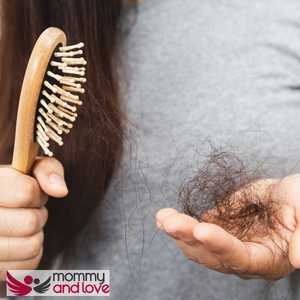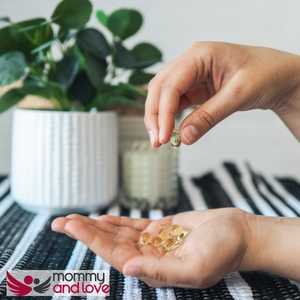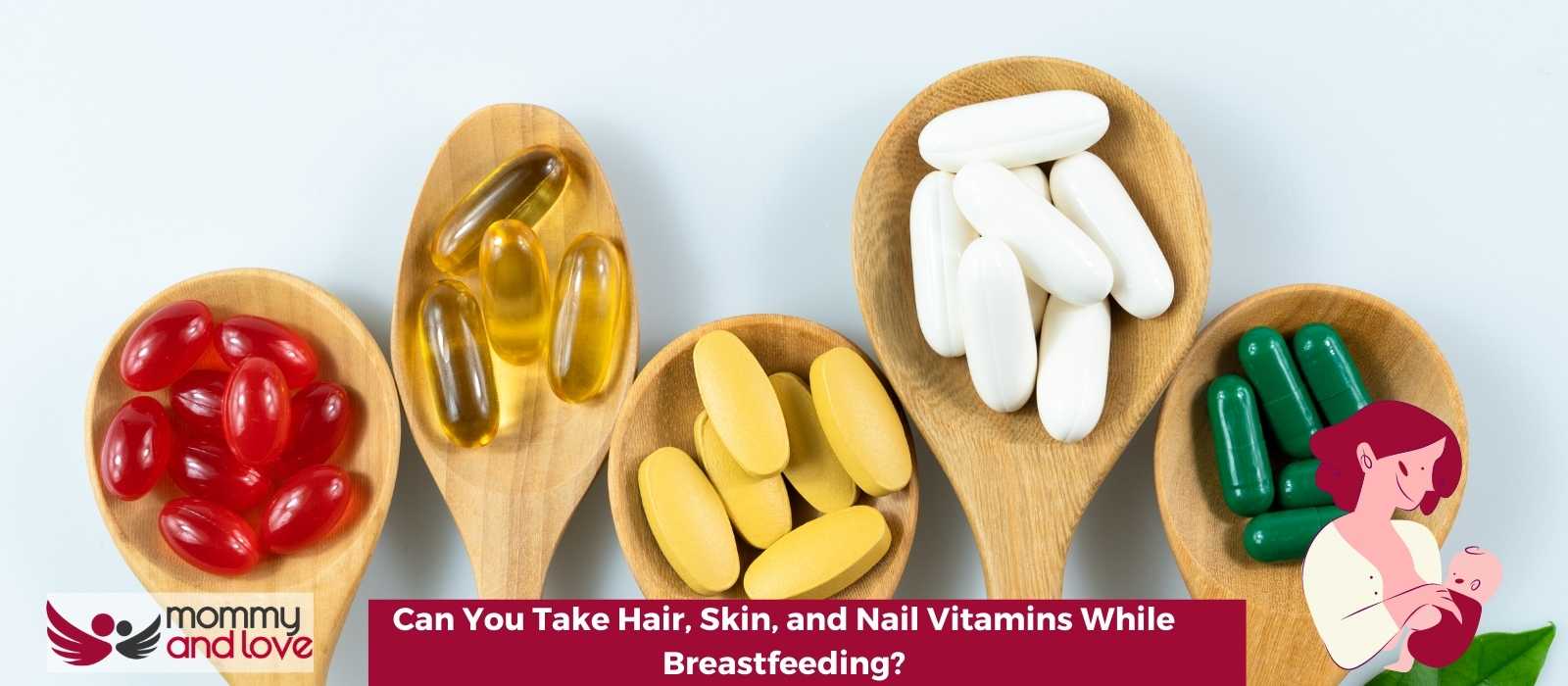If you are a new mother, you may be wondering if it is safe to take hair, skin, and nail vitamins while breastfeeding.
The answer is yes – as long as you are taking the correct type of vitamins. It is important for breastfeeding mothers to know the types of vitamins that are safe for them and explain why they are essential.
We also provide some tips on how to make sure that you are getting the most out of your vitamins.
So if you are looking for ways to improve your hair, skin, and nails while breastfeeding, read on!
Affiliate Disclaimer: As an Affiliate, we earn from qualifying purchases.
Does Breastfeeding Cause Postpartum Hair Loss?
Breastfeeding does not cause hair loss, but increased hair shedding is common during the breastfeeding and postpartum period.

No, it’s not the breastfeeding which causes hair loss, it’s the changing hormones which cause many breastfeeding moms to notice hair loss while they’re breastfeeding.
The increased levels of hormones during pregnancy and lactation may contribute to hair loss or thinning hair.
Many women lose more hair than usual during this period because of changes in hormone levels. When estrogen levels fall, it can make hair seem thinner or shed excessively.
Fortunately, the usual hair growth cycle comes back between 6 and 12 months after giving birth.
Is Taking Vitamin Supplements Safe While Breastfeeding?
Yes, taking certain vitamins can be beneficial for both breastfeeding mothers and their babies.
Vitamin supplements such as vitamin D, vitamin E, folic acid and B complex vitamins are essential during breastfeeding.
Additionally, you have to keep in mind that some essential vitamins, specifically fat-soluble vitamins, can pass through breast milk.
All the vitamins can be essential to your baby, and so does a mineral supplement.
We recommend the following best selling vitamin supplement for latacting mothers:
[amazon bestseller=”vitamins for breastfeeding mom” items=”1″]
How Can I Keep My Hair, Skin, and Nails Healthy While Breastfeeding?
There are a few things you can do to help keep your hair, skin, and nails healthy while breastfeeding.
- Make sure you’re drinking plenty of water. Proper hydration and drinking plenty of support healthy hair, skin, and nails.
- Eat a healthy diet. Eating plenty of fruits, green leafy vegetables, and lean protein will help give your body the nutrients it needs to stay healthy. A poor diet can lead to you shedding all the hair on your head.
- Take a multivitamin. A good multivitamin can help fill in any gaps in your diet and make sure you’re getting all the nutrients you need. fourth, get some exercise. Exercise helps improve circulation and can help keep your skin looking its best.
- Get some rest. Making sure you get enough sleep will help your body recover from the rigors of breastfeeding and can help give a post-pregnancy glow to your dull skin and normal hair cycle.
- Use natural care products. Organic coconut oil can breathe new life into your lifeless hair.
By following these tips, you can help keep your hair, skin, and nails healthy while breastfeeding. Additionally, keep in mind that supplements are no miracle cure.
Hair, Skin and Nails Vitamins From a Healthy and Balanced Diet
There are plenty of ways to get your daily dose of vitamins, but did you know that there are natural sources of hair, nail, and skin vitamins? We’ve done a detailed guide to the best foods for a new mom here.
Here are a few foods that are rich in these essential nutrients to help stop postpartum hair loss:
- Eggs are an excellent source of biotin, which is necessary for healthy hair and nails.
- Spinach is packed with vitamins A and C, both of which are essential for healthy skin.
- Oysters are a great source of zinc, which is necessary for cell growth and repair.
- Dairy products are good sources of B vitamins.
So, next time you’re looking for a way to boost your beauty routine, look no further than your kitchen! These foods will help you achieve healthy and beautiful hair, nails, and skin.
Can I Take Hair Growth Vitamins While Breastfeeding?
Hair growth vitamins are a popular choice for many people looking to improve their hair health.
Yes, you can take hair growth vitamins whilst breastfeeding.
While there is no evidence that hair growth vitamins can cause harm to a nursing infant, breastfeeding women should also be aware that taking certain supplements may affect their own breast milk supply.
If you are considering taking hair growth vitamins while breastfeeding, be sure to speak with your doctor first.
[amazon bestseller=”hair growth vitamins for women” items=”1″]
Can I Take Biotin Supplement While Breastfeeding?

If you’re hoping to get thicker hair, there is no evidence to suggest that biotin supplementation is harmful to breastfeeding infants.
However, as with any supplement, biotin supplements can interact with certain medications, so it is important to be aware of this before taking biotin while breastfeeding.
Speak to your doctor before you take Sports Research Biotin, Vitafusion Extra Strength Biotin Gummies, or Nature’s Bounty Biotin.
In general, biotin is considered safe for most people and helps prevent hair loss and brittle nails and improve skin tone. The recommended dietary allowance of biotin for nursing moms is 35 micrograms.
However, there are a few potential side effects that you should be aware of before taking biotin supplements. These include:
- Diarrhea
- Upset stomach
- Nausea
- Skin rashes
- Cramping
- Headache
If you experience any of these side effects, stop taking the supplement and seek medical attention right away.
Biotin is an important vitamin for many functions in the body and though biotin deficiency is rare, it is not essential for breastfeeding infants.
[amazon bestseller=”biotin vitamins for hair skin and nails organic” items=”1″]
What Vitamins Can I Take for Hair Loss While Breastfeeding?
Vitamin deficiencies are one of the most common causes of postpartum hair loss. If you’re breastfeeding, it’s important to make sure you’re getting enough vitamins and minerals.
Here are some hair vitamins that can help prevent hair loss and have added health benefits:
- Vitamin A helps produce sebum, which keeps hair healthy.
- Vitamin B12 and B complex vitamin help with cell growth, support hair follicle growth and promote healthy nails. Additionally, a B vitamin is essential for the formation of red blood cells and for proper nervous system function.
- Vitamin C helps with collagen production, which strengthens hair.
- Vitamin D helps with calcium absorption, which is important for hair growth. It also provides anti-inflammatory benefits.
- Vitamin E helps support collagen production and protect cells from damage.
Can I Continue Taking Prenatal Vitamins Post-pregnancy?
Pregnant women are usually given prenatal vitamins during pregnancy, but can you still take them after giving birth?
The short answer is yes, you can continue taking your prenatal vitamin specially formulated for pregnant women post-pregnancy.
However, it will probably be better to take postnatal vitamins instead, which are specially formulated for postpartum needs.
It is important to consider the source of your prenatal vitamins. If you are taking a supplement that contains fish oil, for example, you will want to make sure that you are not consuming more than the recommended amount of mercury.
Postpartum Self-Care Tips
What many people don’t realize is that the postpartum period can be very challenging.
Thankfully, there are some things you can do to take care of your postpartum body during this time. Here are four postpartum self-care tips:
- Get enough rest: This may seem impossible with a newborn, but it’s important to try to get as much sleep as you can. If possible, take turns with your partner or family members so that you can each get some rest.
- Eat healthily: Eating nutritious food will help your body heal and give you the energy you need to care for your baby. Root vegetables are good sources of vitamin B. Read Best Foods To Eat After Giving Birth
- Exercise: Getting some moderate exercise will help improve your mood and energy levels. Taking a brisk walk or going for a swim are great options.
- Talk to someone: It’s normal to feel overwhelmed after having a baby. Talk to your partner, family, or friends about how you’re feeling. Or consider seeing a therapist to help you cope with any postpartum emotions.
By following these tips, you can help make the postpartum period a little easier on yourself.
And remember, it’s okay to ask for help when you need it.
Your friends and family will be more than happy to pitch in so that you can take care of yourself and your new baby.
Conclusion
So, can you take hair, skin, and nail vitamins while breast feeding?
Yes! But be mindful of the dosage.
Most hair, skin, and nail supplements contain high levels of biotin and vitamins A and E which could be harmful to your breastfeeding baby in excess.
Stick to the recommended dose on the bottle or consult with a healthcare professional if you have any questions.
By being aware of these potential dangers and taking measures to ensure that you’re not ingesting too much of these vitamins, you can continue safely taking your favorite hair, skin, and nail supplement while nursing your little one.

This article was written by Sandra Baker – full time writer and the mother of four amazing kids (including twins!)
She’s also a breastfeeding counselor and has spent years helping new parents learn how to care for their children. When she’s not writing or caring for her children, Sandra likes to spend time reading and taking walks with her husband.




